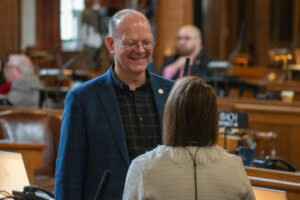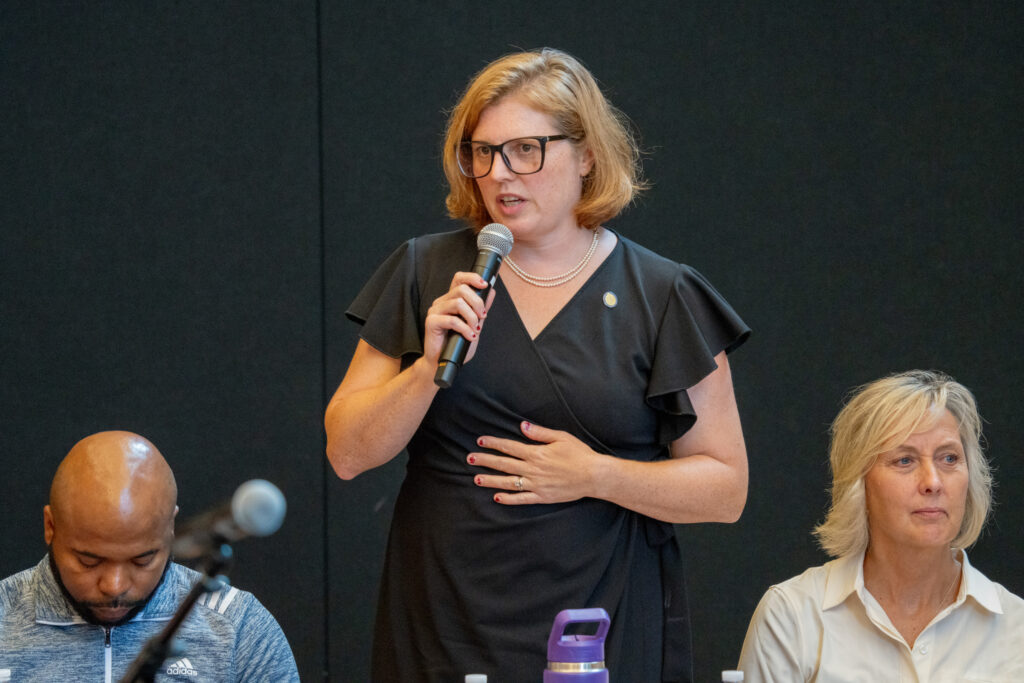State Sen. Machaela Cavanaugh of Omaha leads a listening session for Lincoln residents on property taxes. She is flanked by State Sens. Terrell McKinney of Omaha and Lynne Walz of Fremont. July 22, 2024. (Zach Wendling/Nebraska Examiner)
LINCOLN — As debate on Nebraska’s budget for the next two years begins, one state lawmaker has proposed a counter budget that would eliminate about 16% in anticipated property tax relief.
State Sen. Machaela Cavanaugh of Omaha filed amendments Tuesday to defund the property tax credit meant to offset local school district taxes, which as of last fall became automatic on annual property tax statements. Next year, that fund will grow to $780 million and will grow again by $38 million in the following fiscal year.
Eliminated tax relief
Cavanaugh, a first-time member of the Appropriations Committee, seeks to instead direct about 58% of the $780 million total next year, or $455 million, toward more aid to schools, indirectly lowering property taxes.
School district maximum property tax rates would fall from $1.05 to 80 cents, mirroring proposals from Gov. Jim Pillen and State Sen. Jana Hughes of Seward during the most recent special session on property taxes and again in this year’s Legislative Bill 303.
Another 26% of the property tax credit total, $203 million, would be directed to counties, aimed at reimbursing them for the expenses of operating local jails.
Cavanaugh’s proposal would not touch the $422 million planned next year for a separate property tax credit fund that directly offsets property taxes based on valuations.
The remainder is $122 million that would be directed to other priorities, including investments in public health, public safety, court services and preventing sweeps of certain cash funds to shore up the funds.
‘Solution to a manufactured budget crisis’
The core budget bills are LBs 261 and 264 that the Appropriations Committee advanced with Cavanaugh as a lone “no” vote. While lawmakers must budget for the next two years, Cavanaugh limited the breakdown of her amendments to just the next fiscal year.
While declining to answer certain follow-up questions on her proposal, Cavanaugh said her budget would be balanced over the biennium.
“These amendments are a responsible solution to a manufactured budget crisis,” Cavanaugh said in a statement. “They protect working families, ensure our schools and health systems remain strong, and invest in community-based justice — all without shifting the burden onto Nebraskans through tax hikes or reckless cuts.”
Five Omaha-area senators and two lawmakers from Lincoln and Bellevue host a listening session on property taxes in Omaha on Sunday, July 21, 2024. From left, State Sens. Carol Blood, Christy Armendariz, Jane Raybould, Merv Riepe, Terrell McKinney, John Cavanaugh and Machaela Cavanaugh. (Zach Wendling/Nebraska Examiner)
Separately, the conservative-leaning, free market-focused Platte Institute also proposed a budget alternative that includes “freezing” the school district property tax credits and a separate fund for property tax relief at current levels. That would save about $162 million over the next two years.
Cavanaugh’s budget amendments also would take $135 million from the planned Perkins County Canal in western Nebraska and about $150 million set aside for a new state prison. About $100 million would be invested in the Nebraska State Penitentiary in Lincoln “for comprehensive renovation, modernization and improvement,” while the other amount would be invested elsewhere.
Targeted investments
Among Cavanaugh’s top priorities is preserving or investing:
-
$28.7 million for the Vocational and Life Skills Programming Fund.
-
$15.3 million for behavioral health.
-
$10 million for food banks.
-
$8 million for the Nebraska Water Sustainability Fund.
-
$8 million for the Education Future Fund (retaining an annual $250 million transfer).
-
$5 million for the Nebraska Soil and Water Conservation Fund.
-
$5 million for the State Park Cash Revolving Fund.
-
$4 million for the Middle Income Workforce Housing Investment Fund.
-
$3.5 million for local public health departments.
-
$3 million for domestic violence housing.
-
$1.3 million for state specialized courts (such as problem-solving or veterans courts).
-
$1.2 million for the Economic Recovery Contingency Fund.
-
$1.2 million for court interpreters.
-
$999,422 for probation community corrections.
-
$500,000 for federally qualified health centers.
-
$373,840 for juvenile justice.
-
$284,738 for the Office of Public Guardian.
Cavanaugh proposes to also fund all state “code agencies,” those under the governor’s direct oversight, at each agency’s full appropriations request. All other state agencies would get a budget increase of up to 2.5% next year. She declined to say what the overall spending increase would be compared to the proposed Appropriations Committee budget.
For example, Cavanaugh would give the University of Nebraska $50.6 million more than the Appropriations Committee proposed over the next two years — adding up to a $63.7 million bump for NU.
The Attorney General’s Office would be held flat, which comes as progressives such as Cavanaugh or State Sen. Danielle Conrad of Lincoln have scrutinized its spending.
Similar to the advanced budget bills, Cavanaugh proposes to sweep money from at least 60 cash funds, but she declined to detail the total savings.
“These are not just line items — they are lifelines,” Cavanaugh said. “We’re choosing to invest in people, protect long-term reserves and lay a foundation for future prosperity.”
‘We have to do what we can’
Multiple senators said the Cavanaugh amendments were dead on arrival as property tax relief rises among a top issue for constituents, even though it is assessed locally.

State Sen. Paul Strommen of Sidney meets with his staff on the floor of the Nebraska Legislature. March 26, 2025. (Zach Wendling/Nebraska Examiner)
Pillen, too, has set his sights on increased property tax relief after the budget is balanced, saying in a recent interview with the Nebraska Examiner that he is “100% confident” that the Legislature can balance the budget and keep growth in statewide property taxes flat. That comes in the face of what has in two of the past three years been an annual increase of $300 million.
Last year, for the first time in 26 years, property taxes decreased by $6 million from a $5.3 billion total.
State Sen. Paul Strommen of Sidney, a freshman on the Appropriations Committee, said he has learned this year that part of his committee’s role is balancing taxes and state services, not choosing one over another. Like many senators, he said the top concern for constituents is tax relief.
“At the end of the day, we just have to figure out what we can do to balance all of that,” Strommen said. “Not everybody’s going to be happy, but we have to do what we can.”
SUBSCRIBE: GET THE MORNING HEADLINES DELIVERED TO YOUR INBOX
Read the full article here


